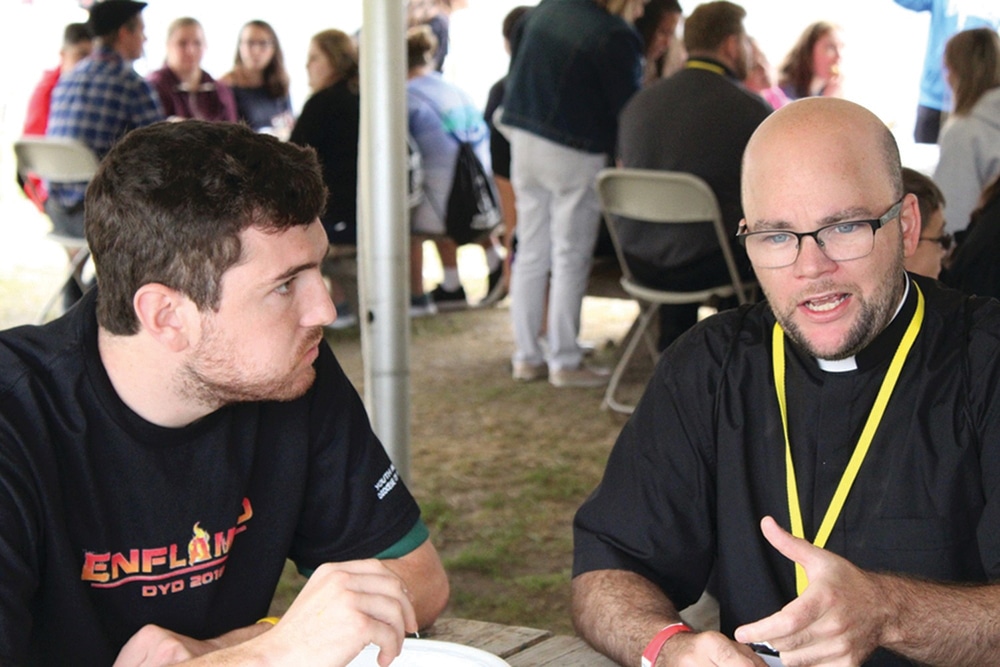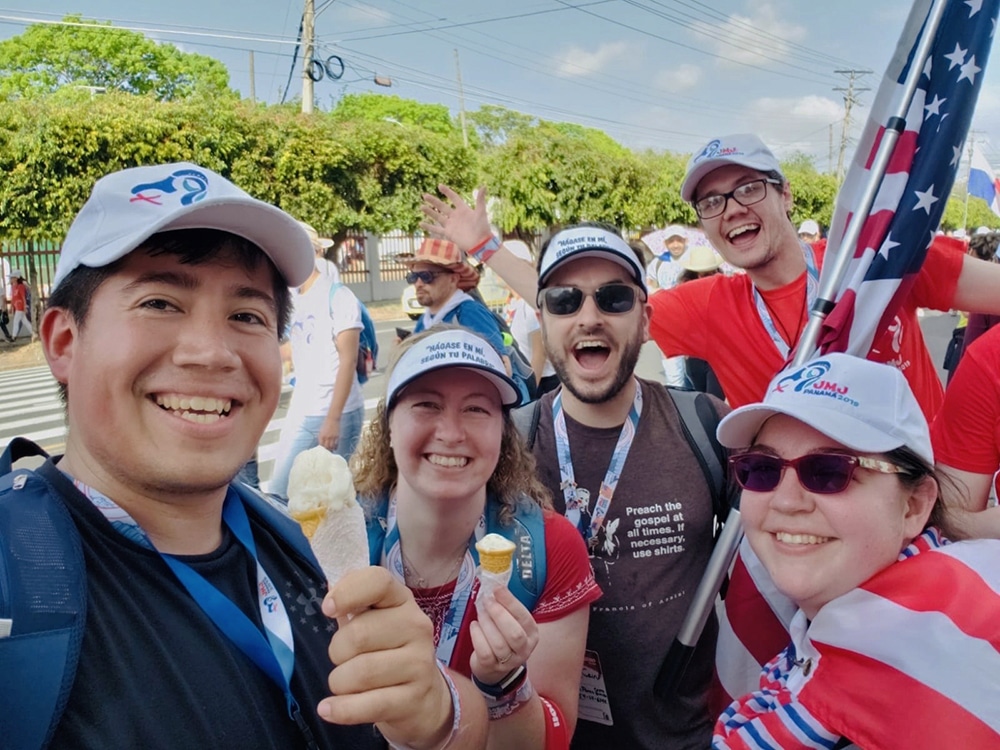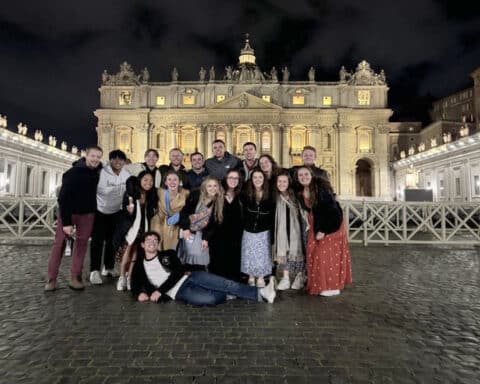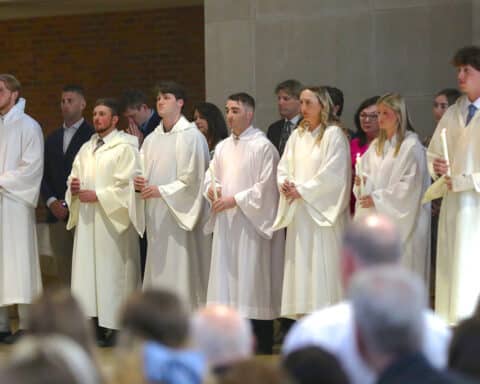When Bob Rice asks groups of teenagers if they believe they were created by God, half of them say that they don’t.
“They think that they were created by luck,” he said. “That’s a very different mindset from 20 years ago, when most of them would buy into the premise of the existence of God who has a plan or purpose for our lives, and of Jesus being real.”
Students in higher education aspiring to be youth ministers — and youth ministers furthering their education — are facing those kinds of challenges in developing effective ways to reach young Catholics.
Rice, who has a doctorate in theology, is director of the Masters of Arts in Catechetics and Evangelization at Franciscan University in Steubenville, Ohio, where he teaches a course (also online) in youth and young adult ministry. He’s also a writer, musician and popular speaker at conferences for all ages.
“I think that the family has been broken down more and more with every consecutive decade. Without a solid foundation of faith coming from the family, young people are far less likely to be living faith-filled lives,” he said. “That’s why there’s an emphasis on finding ways to evangelize and empower families. It’s such a crucial component of youth ministry today.”
Read more Catholic College special section articles here.
Courses at Franciscan University stress developing a missionary attitude toward young people. That means getting them involved in their parishes, and becoming a community of faith that welcomes them and shares with them the joys of the Gospel.
“We need to be willing to enter into their culture and share with them the love of Jesus Christ,” Rice said. “The ministry of accompaniment is so essential for today’s youth. We need to find ways that we can walk with them in their lives, like Jesus did with his disciples on the road to Emmaus, so that we can slowly unpack the word of God and lead them to realize that Jesus is in their midst. We need to show them being a disciple of Jesus Christ is a beautiful and attractive way to live.”
Young people are looking for relationships, but that doesn’t mean that they want adults to act like teenagers or be their best friends.
“It means that we can be someone who can have real conversations with them so that they know they are loved by us, and that we are listening without judging and challenging without condemning, which can only be done in a context of love,” he said.
Searching for truth
Franciscan University annually reaches out to more than 50,000 teenagers through their youth conferences in the United States and Canada. Rice calls it the work of the Holy Spirit and part of the university’s vibrant focus on youth.
There are about 80 to 100 students in the undergraduate program that can lead to a variety of youth ministries.
“Most of the kids went to conferences and decided that they wanted to do something like that, so they come to Steubenville,” Rice said.
Roxanne Sleszynski had no experience when she became the youth minister at St. Peter Damian Parish in Bartlett, Illinois, two years ago.
“I just felt the call,” she said. “Maybe it was the Holy Spirit that made me ask the pastor if I could take over when our youth minister left. I have been there ever since, and I love it.”
She’s currently studying for certification in youth ministry at the University of Mary of the Lake in Chicago. The university also has programs for students pursuing undergraduate degrees (some will go on to graduate school) with focuses in theology that can prepare them for youth ministry. They also offer Franciscan University’s online courses.
Sleszynski left the Church when she was 16 and returned when she was 30.
“I like to share my faith journey with the teens,” she said. “It’s important to understand that God is always with you, and that your journey never ends.”
The teens, she added, are “amazing” and aren’t afraid to let everybody know that they believe in God and in Jesus. “I’m glad that I can be someone who can guide and mentor them,” she said.
Her own faith has grown through the ministry and the classes, and she plans to continue beyond certification.
“The people who come into this role have a heart for taking Christ to the youth and to witnessing with their lives,” said Michelle Shaffer, associate director of the university’s Institute of Pastoral Leadership. “They want to teach the teens and they want to get to know them.”
There are many distractions for today’s youth. The constant barrage of technology disturbs the peace of silence, and so much of what they hear, she added, is influenced by “a post-Christian society.”
“They’re hearing that right is wrong and wrong is right, and they’re very confused,” Shaffer said. “But this generation wants to know the truth. They want you to be honest with them. I believe that they’re really looking for something.”
Countercultural

Alexis Fuentes, who’s finishing her master’s degree in systematic theology at Seton Hall University in South Orange, New Jersey, has worked in youth ministry in the Diocese of Patterson and the Diocese of Newark.
“I’m passionate about evangelization and have always looked for opportunities to share the love of my faith,” she said.
Fuentes is a convert and grew up in a Protestant culture, she said, and was “surrounded by young people who were excited about their faith and well-versed in the Bible.” It was a time, she added, when young Christians could celebrate their faith without experiencing unpopular reactions.
“It’s entirely counterculture to live out your faith as a young Catholic today,” she said. “You have values that aren’t really popular, especially the values in sexual ethics. We’re in an environment that says truth is subjective, but for Catholics, truth is Jesus Christ. We are supposed to live our lives in search of that truth, in search of who Jesus is. But there’s so much distraction for young people that searching for truth and for Christ is almost an afterthought. What is emphasized now for the youth minister is the absolute necessity for one on one mentorship and relationship where we are caring for the individual and accompanying them towards Jesus.”
Training for the ministry, she added, focuses on creating an environment where seeking truth is welcomed and the ministry becomes a safe haven for questioning.
“They want to know, is there a God? Who is he? Is he interested in me? What does it all mean?” Fuentes said. “To be able to encourage a teenager at a very precious time of their life is a real privilege and a real responsibility that we as youth ministers have to take seriously. It really can be life changing.”
John Rinaldo is an adjunct lecturer in the graduate pastoral ministry program at Santa Clara University in Santa Clara, California.
One of the challenges facing the future of evangelizing young Catholics, he noted, is finding a balance with youth ministry and confirmation.

“When we talk about catechism class, the focus is on head knowledge to the extreme,” he said. “The Church has cared more about what we know versus who we know — Jesus Christ — and who we become and our behaviors of discipleship. We still aren’t focused on building relationships with Christ and building habits that make a true disciple. That has less to do with what you know and more to do with who you know and who you become.”
That said, the assumption would be to get young people involved in youth ministry, and then they would apply to be part of a shorter confirmation program that mirrors the RCIA.
“Many dioceses have requirements of what confirmation needs to look like with two years of classes, retreats and service hours. Those aren’t bad things,” Rinaldo said. “The problem is that everyone focuses on fulfilling those requirements that get treated like a check box, and they move on. Young people are more likely to stay engaged in the Church as they get older if they are given opportunities.”
That can include having teenagers actively on the parish finance council, not just as observers, or becoming involved in the liturgy.
“We as leaders in the Church need to get out of our own way,” Rinaldo said. “We need to think bigger and broader and not fall into the trap of ‘we have always done it this way.’ I think that’s one of the biggest issues we have in the Church today.”
Maryann Gogniat Eidemiller writes from Pennsylvania.





